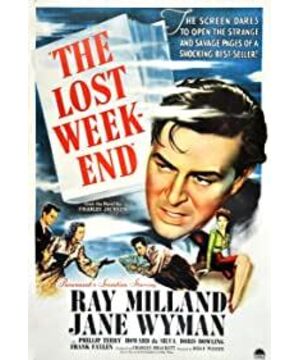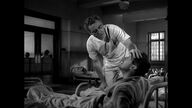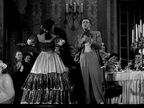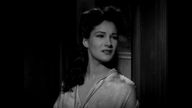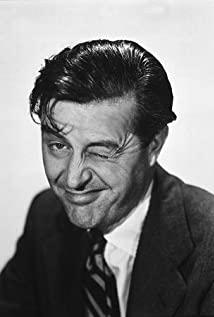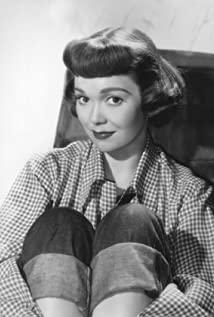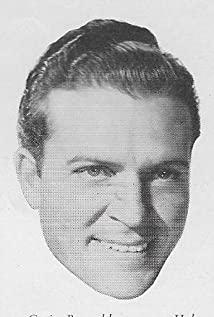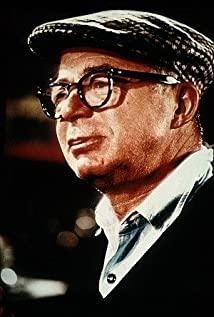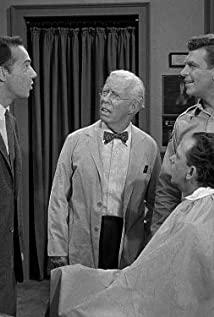Billy Wild’s keen insight into humans is not only reflected in his mastery in directing comedy genres, but also in film noir. He can even shoot a slightly serious theme like "Lost Weekend". The same feeling, as if "Peachy Apartment" was photographed by him far beyond the depth allowed by this subject matter. In "Lost Weekend", the composition of the door frame is everywhere, and the male protagonist Don (played by Ray Mirand) struggles and resists himself in this small space. Every corner of the room may become him. In the place where alcohol is hidden, there is a scene in which Tang came back from the bar and lay on the bed. His desire for alcohol made him struggle like a fish dying of thirst. He opened his eyes and saw the shadow of a wine bottle projected on the ceiling. It turned out that he I forgot to hide the wine bottle in the chandelier under the ceiling before. The wine bottle projected on the ceiling was so big and so bright that it immediately made Tang's spirits up, and his morbid desire for alcohol seemed to be more intensely illuminated by the light. Unlike most other alcoholics, Tang is a handsome, humorous and courteous writer. The reason for his alcoholism is that he can’t write good works. To a certain extent, especially women, for such a writer. Talents not only have admiration, but also arouse their maternal glory and care. The Tang in the film has such an inseparable girlfriend Helen. At first seeing this character, I was very puzzled. In my impression, such characters are generally images of oriental women, forbearance, maternal consciousness, endless. Patience and perseverance, Helen is like this. Facing Tang’s alcoholism, she has always faced Tang’s alcoholism with an optimistic attitude, convinced that there must be a cure. You can say that she is a bit stupid, but at the end of the film, she saw the scene where Tang committed suicide. At that time, I felt that this is definitely not the image of an Oriental woman. Her calmness and wit is definitely not the coping performance that a traditional Oriental woman can have. She has always been a positive and positive image throughout the film, even if Tang’s brothers are Can't help but flee for two or three days.
As I said earlier, Billy Wilder has always been shocked by what people do for happiness. Therefore, in "Lost Weekend", his focus is also on the actions that Tang can make for alcoholism, such as embezzling the $10 that his brother paid the nanny, wanting to pawn his typewriter, and even betraying his hue and becoming a thief. In spite of this, Billy Wilder hopes that we will not resent this character, so he does a little bit of tricks, especially in the scene of putting a bunch of carnations in the lady's purse after Tang Xingqiang. In the scene where Tang walked on the street and wanted to pawn the typewriter three times, the image of three spheres appeared three times. I think these three shots must have the meaning they represent, but I am still not very clear, but I also tried to explain a little bit about the plot in the front of the Lenovo movie. In a scene where Tang was drinking in a bar, the round bottom of the bottle was printed on the bar as a circle image. When the messenger tried to wipe it off, Tang also reached out to stop it. , And several close-ups with round bottoms overlaid together appeared in the subsequent shots, to indicate that he had drunk a lot of glasses, and because he used to be a typewriter for drinking, these three appeared in the process of constantly searching for pawnshops. In the shot of the ball, I understand that Tang's desire for alcohol has become deeper and deeper. His mood at the time was an urgent need for alcohol, even drowning in it.
In "Lost Weekend", Ray Mirand changed his image in "Telephone Murder" and played a downright alcoholic writer. His sparse beard and hobbled back really fit the image of an alcoholic. , Acting skills are also more hierarchical than in "Murder". I don’t know if it’s the lighting in the movie or Mirand’s own acting skills. Whenever I see him, I always feel that he is afraid of the light. Whenever he, Helen and his brother are together, the light always focuses on the latter. For the two of them, perhaps the director deliberately did it, but invisibly, it also added a touch of color to Mirand's acting skills.
"Lost Weekend" in my opinion is not so serious, as if the frivolous "Peachy Apartment" was photographed with rare depth and sadness by Billy Wilder. Perhaps this is the charm of Billy's own director. He can always grasp an intractable balance between the subject matter itself and the story. It is this balance that makes his work enduring even today. Not out of date.
Reprinted in the universe invincible idiot
View more about The Lost Weekend reviews


